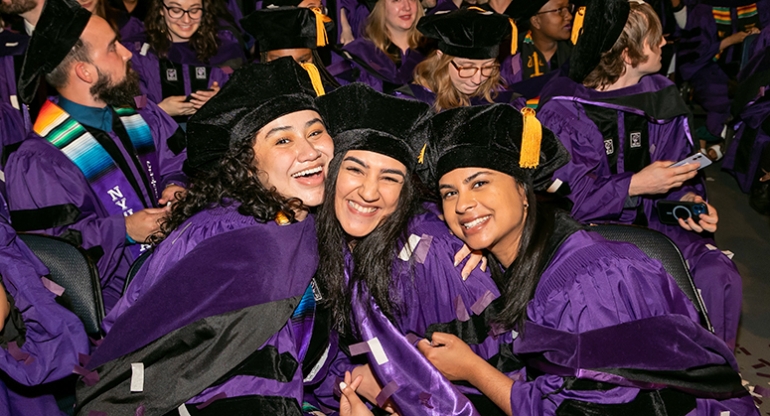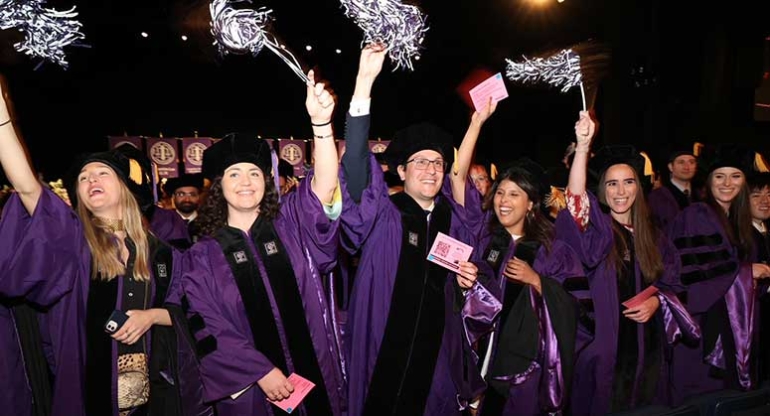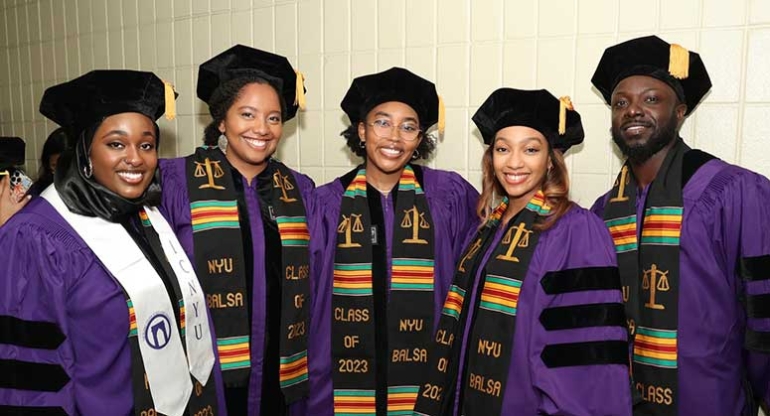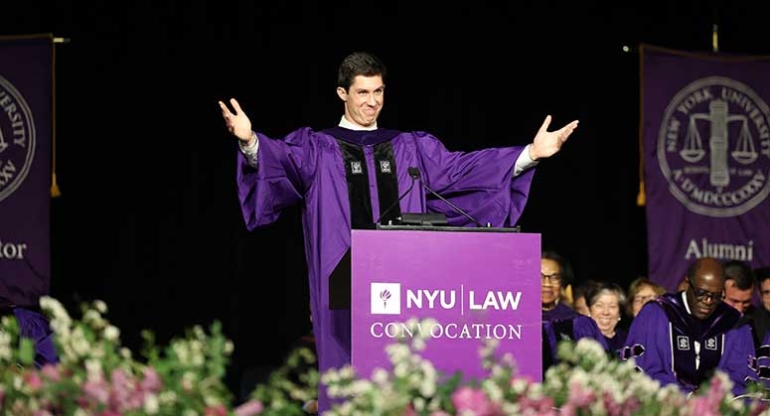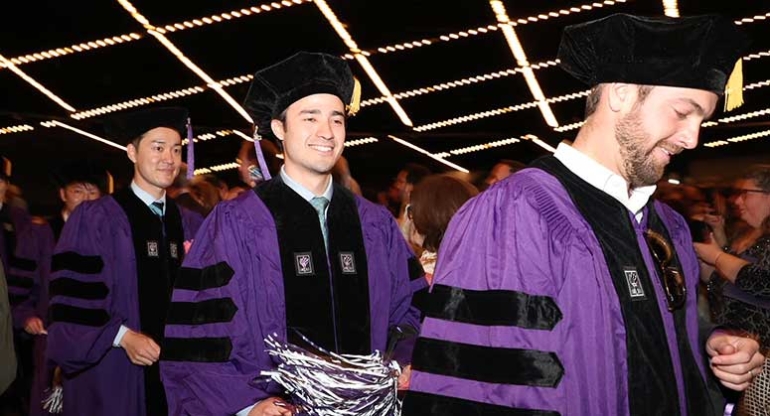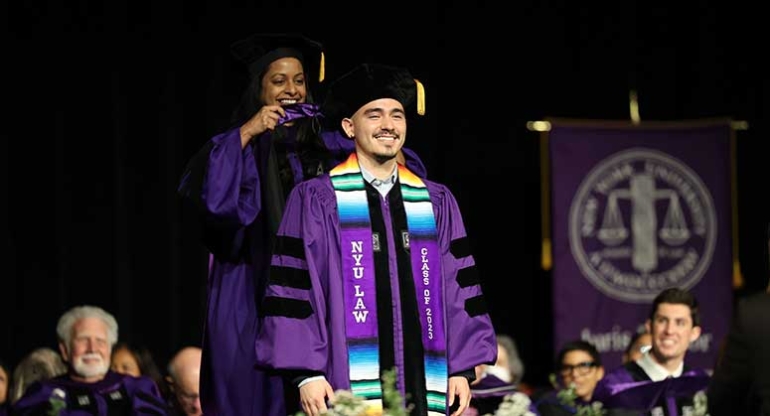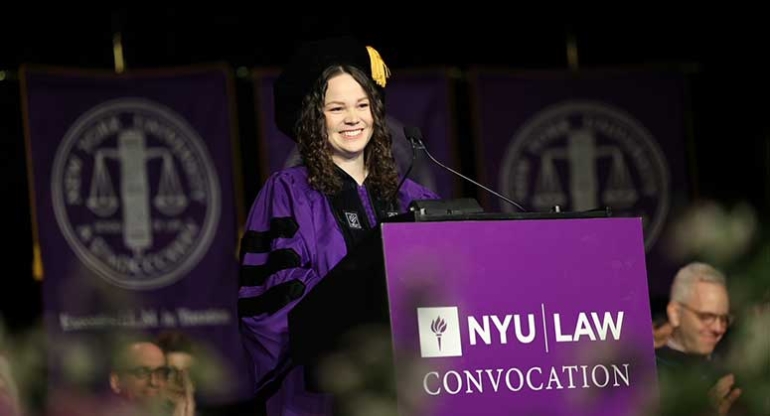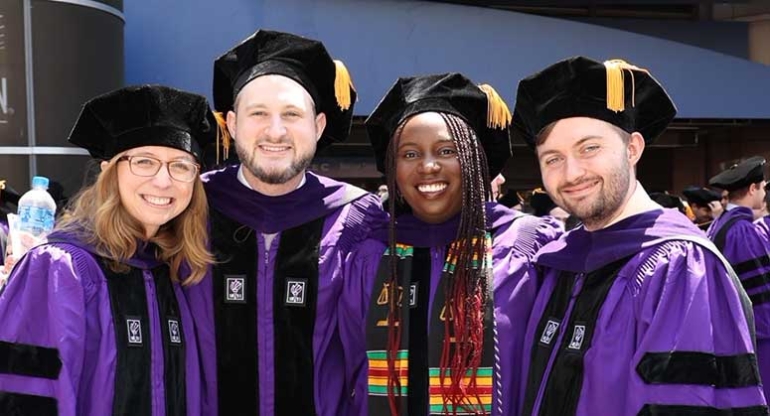NYU Law celebrates the Class of 2023 at Convocation
On May 18, NYU Law gave more than 900 JD, LLM, JSD, and MS graduates a joyous sendoff at Convocation 2023. Family and friends waved pom-poms and snapped photos as the Class of 2023 filled the Theater at Madison Square Garden with a sea of violet.
Sherrilyn Ifill ’87, senior fellow at the Ford Foundation, president and director-counsel emeritus of the NAACP Legal Defense and Educational Fund, and an NYU Law trustee, addressed the graduating JD class during the morning ceremony. Marta Cartabia, former Italian minister of justice and president emerita of the Constitutional Court of Italy, was the keynote speaker at the afternoon ceremony for LLM, JSD, and MS degree recipients.
This year’s graduation exercises were the first to be presided over by Dean Troy McKenzie ’00, who recalled his own Convocation in the same theater years before. McKenzie told the graduates that they will play key roles in shaping policies to address the most pressing issues ahead, such as technology regulation, reproductive rights, police reform, corporate governance, environmental regulation and protection. “All of these are areas where well-trained legal minds are most important,” he said, adding, “That is true even if it turns out that artificial intelligence programs are getting very adept at generating answers to law-related questions. But I know for a fact that minds that create truly innovative ideas are tempered by the intense study and rigorous training that are the trademarks of an NYU Law education.”
In his speech on behalf of the JD class, Walker Schulte Schneider ’23 spoke about what he had learned from his mother, who passed away shortly before he started at NYU Law. When they used to take walks together, Schneider remembered, she would urge him to look up—at a gargoyle on a building’s façade or the interior of an apartment—and somehow, the upward glances yielded conversations that led to rich, unexpected connections and ideas.
During his 1L year, Schneider said, learning to think like a lawyer meant looking down. “My thoughts grew more nuanced, and I think I became a better critical thinker,” he said. “I’ll admit it—I liked it. Over the course of that first fall, though, I began thinking like a lawyer about other aspects of my life…. I became so hyperfocused on scrutinizing fact patterns and analyzing cases that I cut my field of vision in half.” Ultimately, Schneider said, he reminded himself to pause to look up as well as down to achieve balance in his life.
In her speech to JD graduates, Ifill considered the many societal challenges that the graduating class would face: threats to democracy and the rule of law, economic and racial inequity, dysfunction in the criminal legal system, threats to reproductive rights, and current trends toward censorship in public education and public libraries. But she expressed optimism that current and future attorneys would rise to those challenges.
“You are becoming lawyers at this moment when our democracy seems poised on the precipice,” said Ifill. “But you are also becoming lawyers at a moment when because of this democratic crisis, because the flaws in our democracy have been exposed and so many weaknesses revealed, minds and hearts are open to reimagining our national identity and commitments…. This is the time to be bold. This is the time to refuse to accept half-measures. The solutions we seek must go to the root of the flaws in our democracy, not the symptoms.”
As he urged graduates to commit to the highest ideals of their chosen profession, NYU Law Board of Trustees Chair David Tanner ’84 also alluded to challenges facing democratic government. “With democracy under threat, leading with your values cannot be reduced solely to zealous advocacy for one’s client or one’s personal interest,” he said. “As members of the legal profession, even in situations that are adversarial by design, we all have an obligation to look beyond winning and to consider carefully and intentionally what we owe to one another, to our clients, and to our community.”
In her afternoon remarks to LLM and other graduate students, Cartabia spoke about several surprising, unsettling “fragments of justice” that had inspired her in her career as a judge, academic, and justice minister. Among them was a lecture at NYU Law by South African judge and anti-apartheid activist Albie Sachs. Severely injured in an attack, he dissuaded a friend from taking vengeance and later met with his former attackers. “Taming the instinct of revenge. Meeting with the author of an attack that caused you a permanent disability or cost the life of your father: what kind of justice is this?” Cartabia said. “I was disoriented, uneasy, and disconcerted. And yet captured.”
Cartabia said she has realized that over time her opinions were inflected with the same language of cooperation and understanding that had surprised her in those fragments of justice. It’s important, she told the graduates, to take seriously the discomfort that comes in cases where the proper application of justice seems difficult.
“That’s where new forms of justice come from,” she said. “And often it is grounded in a ‘both/and’ approach, rather than an ‘either/or approach.’”
At her turn at the podium, LLM student speaker Veronika Reisinger LLM ’23 asked her fellow graduates to look down at the NYU torch embroidered on their gowns. “This is a symbol for our burning passion for the law, a trait that makes us not turn away from problems, but shine our light on challenges,” she said, citing a few of the issues that her classmates had worked on at NYU Law, including climate change and human rights.
“We often take light for granted, but it is in the darkest places…that we realize its essential role,” Reisinger said. “I’m certain from tomorrow onwards, today’s graduates will be illuminating rooms all around the globe striving to bridge the gaps that divide us. Our NYU torches will be glowing in all of the corners of the world.”
Posted May 22, 2023




